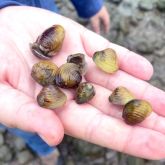Freshwater gold clam
Alert
Have you seen freshwater gold clam?
Be on the lookout for freshwater gold clam and report it to Biosecurity Queensland. Early detection and reporting are the key elements in controlling freshwater gold clam.
Call us on 13 25 23.

Close-up of multiple freshwater gold clams showing colour, shape and size

Multiple freshwater gold calms amongst rocks on river bank
The freshwater gold clam is a freshwater invasive clam that was detected at Colleges Crossing (west of Brisbane) and at some other sites along the Brisbane River.
It has not been positively identified in Australia before this detection. Surveillance is underway to determine the extent of freshwater gold clams in the river system.
The freshwater gold clam is a highly invasive species owing to its:
- rapid growth rate
- short life span
- high reproductive rate
- ability to broadcast its larvae over a broad area using water flows in rivers.
It is a long-distance hitchhiker in ballast water and through the aquarium trade.
Scientific name
Other names
- Asian clam
- Asian golden clam
- Pygmy clam
Similar species
- Native freshwater bivalves that inhabit waterways throughout South-East Queensland.
Description
- Inflated, round to triangular shell is yellowish brown to black with evenly spaced ridges.
- Can grow to a shell length of 50–65mm, although it is usually less than 25mm.
Habitat
- Tolerates a wide variety of substrate/habitat types.
Distribution
- Limited locations along the Brisbane River in the Ipswich region.
- Established in New Zealand, and North and South America.
- Spreads when it is:
- attached to boats or carried in ballast water
- used as bait
- sold through the aquarium trade
- carried with water currents.
Life cycle
- Fertilised eggs form larvae, which exist in plankton for up to 55 days before settling.
- Lives up to 7 years.
- Generally thought to reproduce twice a year, but this may depend on climatic and ecological factors.
Impacts
Environmental
- Highly invasive
- Can displace native clams and diminish water quality
Economic
- Can block plumbing, heat exchangers and other water infrastructure
Control
Slipway operators, vessel inspectors and vessel owners should thoroughly check, clean and, where possible, dry vessel hulls and niche areas such as internal seawater systems.
If you think you have seen a freshwater gold clam, report it to Biosecurity Queensland online, by phone or in person. Take reasonable and practical measures to prevent gold clams from spreading until an authorised officer contacts you.
Legal requirements
- The freshwater gold clam is not a prohibited or restricted matter under the Biosecurity Act 2014. However, by law, everyone has a general biosecurity obligation (GBO) to take reasonable and practical measures to minimise the biosecurity risks associated with invasive species under their control.
- Local governments must have a biosecurity plan that covers invasive species in their area. This plan may include actions to be taken on freshwater gold clams. Some of these actions may be required under local laws. Contact your local government for more information.